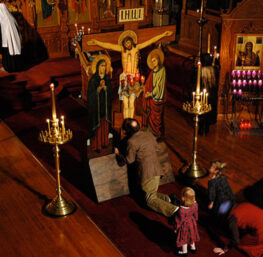 by Albin Sadar –
by Albin Sadar –
What has the Church these past many years been doing to slow the roll of the radical left? Unfortunately, in many cases, the Church has jumped right on the merry-go-round.
![]()
I was fortunate enough to see an early screening of a brand-new film based on Eric Metaxas’ best-selling book, Letter to the American Church. The hour-long film, which shares the book’s name, vividly lays out the case that it is high time Christians in this country got seriously involved in the cultural and political arena.
The author’s narration is accompanied by rapid-fire images that help convey the urgency of the days in which we live. They force us to acknowledge things that, a mere dozen or so years ago, were unthinkable:
– Kindergarten children at drag queen shows;
– males competing in girls’ sports because they are convinced they are females;
– free speech being silenced;
– a woman being fired for “misgendering” a coworker;
– the government shutting down churches and keeping strip clubs open in the name of “science;” and a mysterious virus,
to name just a few profound changes in America that are now the norm.
Even “business as usual” is more “business as unusual” in a corporate world that mirrors the culture, hoping in that way to achieve the largest profit margins.
And what has the Church these past many years been doing to slow the roll of this Looney Tunes juggernaut? Unfortunately, in many cases, the Church has jumped right on the merry-go-round, displaying rainbow and BLM flags and welcoming gay pageantry right into the sanctuary.
For those churches at the forefront of welcoming the left, it is a pretty sure bet that they are not really “Christian” in any true sense (“By their fruit you will know them”). But what excuse does the true, professing Church have for not giving these same leftist initiatives some heartfelt resistance?
Do we in the Church believe that being “nice” is the way to “win the lost?” Or do we believe that compromise is the best way to deal with difficult, contentious situations, forgetting that we have been advised “not to give the devil a foothold?” As I point out in my new book, Obvious: Seeing the Evil That’s in Plain Sight and Doing Something About It, think about it this way when you consider the fact that the faithful keep compromising with the left:
The left is a wall. And that wall, standing for some nutty idea it wants to make mainstream, begins by saying to those of you who stand in front of it, albeit at some distance, “Hey, meet me halfway.” So, you take a couple of steps closer. But the left, just like a wall, stays right where it is because it is immovable. Then, a little while later, the wall again says, “Hey, meet me halfway.” And, again, you comply.
Pretty soon, it begins to dawn on you where this is going. That leftist wall has not moved an inch, but you are now standing right up against the wall.
In a well-meaning church, some might even begin to side with the wall. They are looking back at other people now and saying, along with the wall, “Hey, meet us halfway!”
You see, the wall doesn’t move. It doesn’t even say, “Oops,” for small or great errors. Doing so could cause a dangerous shift in its foundation, and that’s not going to happen. Instead, in many instances, the left is silent, and in many wrong-move situations, it reinforces itself by doubling down.
Why is the left so immovable about its wild, unnatural positions, and why is the Church, which Jesus Christ built “upon the Rock,” so wishy-washy? The Church’s foundation for 2,000 years has been that the Bible contains the immortal, immutable Truths of an almighty, loving God, and on these Truths we stand. But lately, it’s more like, “Heaven knows, anything goes.”
Are we called to go along to get along so nobody thinks we’re weird? Should our attitude be, “Hey, things in life will swing to the left, then swing to the right, and at some point settle in the middle? The Church should be part of that pendulum so we can preach the Gospel with high hopes that some of it sticks.”
That’s not how it used to be. Ask yourself these questions:
Did the Apostles just wander around the cities only preaching the Gospel? Did they confront the culture and the politics of their day (whether in the public square or in the synagogue)? Did they end up being beaten and thrown into prison because they “played it safe?”
Did Jesus not upset a few big wigs in the upper echelons of power by turning over money-changing tables in the synagogue, sending demons into a herd of pigs, and healing the child of a Roman centurion, a man responsible for enforcing the laws of an occupying government?
For those out there still convinced that Christians are only supposed to preach the Gospel and let the chips fall where they may, consider the word “politics.” The definition involves “the affairs of the city.” Did Jesus not say that we were to go into the whole world, which is made up of cities, and preach the good news? And would that not compel us to become involved in what is happening in those cities and the affairs of the world around us?
If staying on the sidelines because the “I don’t get involved in politics” excuse is still your game, consider this: When the government demands that your children comply with new LGBTQ+ regulations at school, do you tell them, “My kids don’t have to. I’m not political.”
We have gotten to this place in our society and our government because we have not heeded the warning signs of the cantankerous 1960s. Here’s just one example of how the 1960s, which created a culture from which we simply withdraw, have planted acorns that have grown into sturdy but incredibly misshapen trees: Beginning in the 1960s, we heard the seemingly benign phrase, “If it feels good, do it.” A half-dozen decades later, we have children demanding, “You must alter my body with irreversible surgery because I don’t feel like I’m the right sex.”
The film Letter to the American Church reveals some stark and undeniable similarities between the German church of the 1930s and 1940s and the Church here in America over the past decades. And therein lies the ticking clock—or time bomb. Will a woke church wake up in time?
Let’s be encouraged. Scripture gives us our marching orders with many uplifting, bold reminders. I will close with two:
“God has not given us a Spirit of fear, but of power, of love, and of sound mind.” (2 Timothy 1:7)
and
“We know that all things work together for good for those who love God and are called according to His purpose.” (Romans 8:28)
Will there be victory? If we do our part, we shall see. Ultimately, “the battle belongs to the Lord.”
—————————————————
HT: American Greatness. (Bolding of key words and phrases, and some minor content organizational changes made by blog editors to improve readability.)




This starts with our Orthodox leaders speaking up, unified and vociferously proclaiming righteousness in the public square, for “righteousness exalteth a nation.” Next, at least every two months on any given Sunday or Sundays, the teaching on Natural Law needs to be reiterated from the pulpit using the Holy Scriptures as the standard, particularly the book of Romans as a start. The Holy Prophets of the Old Testament were constantly in the ears of kings as the moral conscience reminding them of what is right and just as manifested by the story of King David.
The shepherds have been hiding and cow-towing to the zeitgeist, too busy fighting amongst themselves about jurisdictions, wealth transfer, and who is the most “Orthodox,” rearranging the deck chairs on the moral and cultural Titanic. Once again, politics and religion are not mutually exclusive entities but interwoven, hence dictating the mores of a society. Do we serve Christ or the god of tax exempt status?!